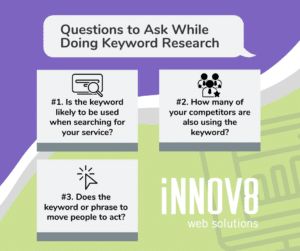Are you using keywords effectively? Just think: unless someone clicks a direct link to your website, they likely needed to search a word or a phrase to find it. There is also a good chance that it took them longer to find your site than they had anticipated. Heaven forbid they Google your business and end up on page 3 of the search results before finding you! If statistics are your thing, get this: 75% of people do not go past the first page of Google results.
The chances that they got to you are so slim. Think about all the competition they saw before you! Perhaps your keywords are bringing the wrong people to the site. Click-throughs don’t mean much if someone clicks out of your site. This increases the bounce rate and hurts your site. These scenarios are reasons why keyword research is so important for any website. Keyword research should be a focus for every business from websites to social media platforms and content.
Keyword research is one of the main factors that make up the toolset of SEO (Search Engine Optimization) practices. Researching keywords can help a website discover what topics are increasing traffic. As well as for finding out what people are searching for to get to their website. Before we cover the process more, let’s first define what a keyword is.
What is a Keyword?
In SEO we define a keyword as a specific word, or phrase, that is put into a search engine to find a related topic. For example, we have someone searching for Corgis for sale. They type “Corgis near me” into Google’s search bar. Their search results will be filtered based on the keyword “Corgis” and the keyword-phrase “near me.” Search engines give very large and broad results. But, they will always rank the most popular and relevant results first based on the keyword and phrasing.
Time to consider the research. It’s best to spend some time brainstorming and creating a seed list. A seed list is made up of all relevant words and phrases that best describe the content on a page within your website. While making the list it is important to be able to answers a few questions with those words. Will this word help people find what they are looking for? Will this drive the right kind of user to our site?
Implementing these questions during the early stages will help narrow down the list. As you work through your keywords, your research may lead you to that golden keyword. Using a keyword that will lead someone right where you need them will benefit your site by raising your traffic and causing a lower bounce rate. Also, it’s important to use something that is going to lead a visitor to do what you want on your page. So if you want someone to fill out a survey or sign up for a newsletter, include that in your keywording.
What to Ask
A few other things to ask while building the list would be:
1. What is the likelihood of someone using that specific vocabulary or word to search for your services or product?
If you spend time creating a keyword that is long and tricky you won’t see any results. Going with a commonly used word may perfectly reflect the page and do more good.
2. How many of your competitors are also using the keyword?
There are bound to be other companies using that same word as you if you are in a common service or product line. This is where content becomes king. Go ahead and use that keyword or phrase but make your written and visual content stand out! We recommend turning to one of the well-known SEO researchers out there to find out how your keyword choices rank. Visit Moz.com to check! We also recommend using the Google Keyword Planner
3. Is there a way to move people with the keyword or phrasing?
If someone lands on your page due to a great keyword, you can gain more credibility by having users move through your site. This helps your bounce rates go down and your ranking goes up. Additionally, this proves to Google that your keyword choice is actually relevant to your business. It’s good to have a button for more information, a call to action, or a form on your site. All of these increase interactivity with your website.

Keep in mind that keywords and search results depend on other factors. There isn’t much point to Google sending someone to your site if it’s hard to navigate or understand. Before putting the focus on your keywords, make sure your website is user-friendly! Or your results will be skewed by people leaving for other reasons. Great content also needs great design. Design goes hand in hand with the user experience, in turn telling search engines a lot about your impression with users. Lastly, you may have great content, but if it’s hard to find on the website, it will be hard to find through Google. Content itself needs to be high quality, relevant to your business, and credible in order for it to be shared and rank well with Google.
Basically, increased traffic, higher rankings, lowered bounce rates, and separating your business from others is why keyword research is important. As time goes on and you become more familiar with this you can work towards evolving keywords to be part of your brand. Be sure to use Google Analytics to gain feedback from search results, user navigation, and page results. If you’re stuck and needing help, feel free to reach out to us!
Are you looking for a consultation? Schedule one today
The original article was published on September 11th, 2018. Edited to clarify and add an image.




